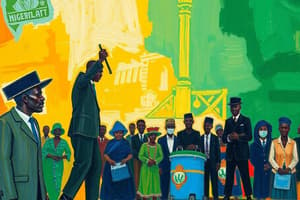Podcast
Questions and Answers
Given Nigeria's economic reliance on oil, what strategy would best mitigate the risks associated with fluctuating global oil prices?
Given Nigeria's economic reliance on oil, what strategy would best mitigate the risks associated with fluctuating global oil prices?
- Investing solely in the oil sector to enhance its efficiency.
- Borrowing heavily against future oil revenues to fund current expenditures.
- Increasing oil production to maximize short-term revenue.
- Diversifying the economy into sectors like agriculture, manufacturing, and technology. (correct)
Considering Nigeria's diverse ethnic and religious groups, which approach would be most effective in promoting national unity and reducing conflict?
Considering Nigeria's diverse ethnic and religious groups, which approach would be most effective in promoting national unity and reducing conflict?
- Enforcing a single national language and religion to create a unified identity.
- Prioritizing the interests of the majority ethnic and religious groups over those of minorities.
- Ignoring ethnic and religious differences in favor of a purely economic development agenda.
- Implementing policies that recognize and respect the rights and cultural differences of all groups. (correct)
What is the most likely consequence of the removal of fuel subsidies in Nigeria, considering its current economic conditions?
What is the most likely consequence of the removal of fuel subsidies in Nigeria, considering its current economic conditions?
- A short-term increase in the cost of living, potentially followed by long-term economic gains. (correct)
- A rapid stabilization of the Naira against major international currencies.
- A decrease in government revenue due to reduced economic activity.
- An immediate and significant decrease in the cost of transportation and goods.
Given Nigeria's membership in ECOWAS, how can it best leverage this membership to address its security challenges?
Given Nigeria's membership in ECOWAS, how can it best leverage this membership to address its security challenges?
Considering Nigeria's high population growth rate and youth unemployment, which strategy would be most effective in addressing these interconnected issues?
Considering Nigeria's high population growth rate and youth unemployment, which strategy would be most effective in addressing these interconnected issues?
Bola Ahmed Tinubu was elected president in 2023. Considering the existing political landscape, what is the most significant challenge he is likely to face during his first term?
Bola Ahmed Tinubu was elected president in 2023. Considering the existing political landscape, what is the most significant challenge he is likely to face during his first term?
Given the ongoing security challenges in Nigeria, which approach would likely be most effective in achieving long-term peace and stability?
Given the ongoing security challenges in Nigeria, which approach would likely be most effective in achieving long-term peace and stability?
Nigeria is a member of OPEC. What is the most likely impact of this membership on Nigeria's economy?
Nigeria is a member of OPEC. What is the most likely impact of this membership on Nigeria's economy?
Considering Nigeria's commitment to peacekeeping operations in Africa, what is the most significant benefit it gains from this involvement?
Considering Nigeria's commitment to peacekeeping operations in Africa, what is the most significant benefit it gains from this involvement?
What would be the effect of the Independent National Electoral Commission (INEC) becoming compromised?
What would be the effect of the Independent National Electoral Commission (INEC) becoming compromised?
Flashcards
Nigeria
Nigeria
A federal republic in West Africa, the most populous African country.
October 1, 1960
October 1, 1960
The year Nigeria gained independence from British rule.
Bola Ahmed Tinubu
Bola Ahmed Tinubu
The current President of Nigeria, elected in 2023.
Bicameral legislature
Bicameral legislature
Signup and view all the flashcards
APC
APC
Signup and view all the flashcards
INEC
INEC
Signup and view all the flashcards
Oil Sector
Oil Sector
Signup and view all the flashcards
Naira (NGN)
Naira (NGN)
Signup and view all the flashcards
Boko Haram
Boko Haram
Signup and view all the flashcards
African Union (AU)
African Union (AU)
Signup and view all the flashcards
Study Notes
- Nigeria is a federal republic in West Africa, with a population of over 200 million people, making it the most populous African country.
- It gained independence from British rule on October 1, 1960.
Political Landscape
- The current President of Nigeria is Bola Ahmed Tinubu, elected in 2023.
- Nigeria operates under a presidential system, with a bicameral legislature: the Senate and the House of Representatives.
- Key political parties include the All Progressives Congress (APC) and the People's Democratic Party (PDP).
- Elections are held every four years. The Independent National Electoral Commission (INEC) is responsible for conducting elections.
- Nigeria faces challenges related to political corruption, electoral violence, and governance issues.
Economy
- Nigeria has the largest economy in Africa, driven primarily by its oil sector.
- Oil accounts for a significant percentage of Nigeria's export earnings and government revenue.
- Diversification of the economy is a major goal, with efforts to promote agriculture, manufacturing, and technology.
- Key economic challenges include unemployment, poverty, income inequality, and inadequate infrastructure.
- The Nigerian currency is the Naira (NGN).
- The country is a member of the Economic Community of West African States (ECOWAS).
Security
- Nigeria faces several security challenges, including:
- Boko Haram insurgency in the northeast.
- Banditry and farmer-herder conflicts in the north-central and northwest regions.
- Separatist agitations in the southeast.
- Oil theft and piracy in the Niger Delta.
- The Nigerian military and security forces are engaged in efforts to address these security threats.
- Nigeria collaborates with neighboring countries and international partners on security initiatives.
Social Issues
- Major social issues in Nigeria include:
- High population growth rate.
- Ethnic and religious diversity, sometimes leading to conflicts.
- High rates of poverty and unemployment, particularly among youth.
- Inadequate access to quality education and healthcare services.
- Corruption and lack of accountability.
- Efforts are being made to address these issues through various government programs and initiatives, as well as civil society engagement.
Recent Events
- Elections: Nigeria held general elections in February 2023. Bola Ahmed Tinubu won the presidential election.
- Economic reforms: The government has implemented economic reforms, including the removal of fuel subsidies and efforts to stabilize the exchange rate.
- Security operations: Ongoing military operations are aimed at combating insurgency, banditry, and other forms of insecurity.
- Social programs: Various social intervention programs are in place to alleviate poverty and support vulnerable populations.
Foreign Relations
- Nigeria plays a prominent role in regional and international affairs.
- It is a member of the African Union (AU), the United Nations (UN), and the Organization of Petroleum Exporting Countries (OPEC).
- Nigeria is a major contributor to peacekeeping operations in Africa.
- The country maintains diplomatic relations with countries around the world, focusing on trade, security, and development cooperation.
Studying That Suits You
Use AI to generate personalized quizzes and flashcards to suit your learning preferences.




